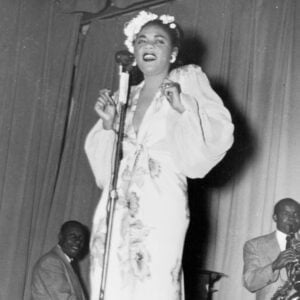True Story United States vs. Billie Holiday
In 1955, her friend and sometimes manager Maely Bartholomew, who was married to journalist William Dufty, invited Holiday to come to stay at their apartment to hide out—from the authorities, from reporters, from the toxic men in her life (including her louse of a last husband, Louis McKay). That’s when she and Dufty got started on the book.
It was assumed, probably correctly, that, after not playing a show in New York for eight years due to her cabaret license being revoked, Billie Holiday was interested in collaborating on the story of her life because she needed money.
“She was writing for money to support her drug habit, and for publicity to make it appear that she was off the habit and to get her back her cabaret card,” wrote journalist Linda Kuehl, whose years’ worth of research, including interviews with people who were close to the singer, is the most drawn-upon archive for Holiday biographers aside from Lady Sings the Blues. (An odd case in itself, Kuehl planned to write the definitive book on Holiday herself, but she died in 1978, having jumped—according to police—off a building in Washington, D.C. Family members disputed the conclusion that she took her own life.)
Filmmaker James Erskine acquired Kuehl’s archive and used it to make the 2020 documentary Billie, which was released in November. In one taped interview, she’s heard asking drummer Jonathan “Jo” Jones what they went through back in the 1940s and 1950s, traveling through the South to perform.
“We was going through hell!” he exclaimed. “Miss Billie Holiday didn’t have the privilege of using a toilet in a filling station. The boys at least could go out in the woods. You don’t know anything about it because you’ve never had to subjugate yourself to it. Never!”
Talking to The Guardian when the documentary came out, Erskine said, “We finished the film last year and I didn’t see it again until September. I was shocked at how political it felt. When we were making it, we felt that we were presenting truths about things that everybody understood, the white man’s power, structural racism. I was setting out to make a film about Billie, and one of the joys of it is that you get to really see her. But I guess it tells us that we haven’t really addressed any generational wounds in society.”


